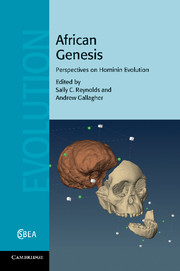Book contents
- African Genesis:
- Series page
- African Genesis
- Copyright page
- Contents
- Contributors
- Foreword
- Acknowledgements
- 1 African Genesis: an evolving paradigm
- 2 Academic genealogy
- Part I In search of origins: evolutionary theory, new species and paths into the past
- Part II Hominin morphology through time: brains, bodies and teeth
- Part III Modern human origins: patterns and processes
- Part IV In search of context: hominin environments, behaviour and lithic cultures
- 22 Animal palaeocommunity variability and habitat preference of the robust australopiths in South Africa
- 23 Impacts of environmental change and community ecology on the composition and diversity of the southern African monkey fauna from the Plio-Pleistocene to the present
- 24 African Genesis revisited: reflections on Raymond Dart and the ‘predatory transition from ape(-man) to man’
- 25 Shared intention in early artefacts: an exploration of deep structure and implications for communication and language
- 26 Sibudu Cave: recent archaeological work on the Middle Stone Age
- 27 The oldest burials and their significance
- Index
- Plate Section
27 - The oldest burials and their significance
from Part IV - In search of context: hominin environments, behaviour and lithic cultures
Published online by Cambridge University Press: 05 April 2012
- African Genesis:
- Series page
- African Genesis
- Copyright page
- Contents
- Contributors
- Foreword
- Acknowledgements
- 1 African Genesis: an evolving paradigm
- 2 Academic genealogy
- Part I In search of origins: evolutionary theory, new species and paths into the past
- Part II Hominin morphology through time: brains, bodies and teeth
- Part III Modern human origins: patterns and processes
- Part IV In search of context: hominin environments, behaviour and lithic cultures
- 22 Animal palaeocommunity variability and habitat preference of the robust australopiths in South Africa
- 23 Impacts of environmental change and community ecology on the composition and diversity of the southern African monkey fauna from the Plio-Pleistocene to the present
- 24 African Genesis revisited: reflections on Raymond Dart and the ‘predatory transition from ape(-man) to man’
- 25 Shared intention in early artefacts: an exploration of deep structure and implications for communication and language
- 26 Sibudu Cave: recent archaeological work on the Middle Stone Age
- 27 The oldest burials and their significance
- Index
- Plate Section
Summary
The oldest burials are found in the Middle Palaeolithic of Mt. Carmel and the Galilee, in Israel, 130 to 100 ka ago. Two populations, modern humans and Neandertals are involved, with a total of some 40 individuals. The burial practices of the two populations are similar and consist of placing the corpse in a prepared pit, sometimes inserting grave goods, then filling the pit. Protecting the corpse from scavenging animals, the burial reflects the oldest concern for human dignity. The gifts offered to the dead might be alluding to some kind of religious belief in rebirth and afterlife. Accordingly, the use of an advanced syntactic language is suggested for both modern humans and Neandertals in the Levant.
- Type
- Chapter
- Information
- African GenesisPerspectives on Hominin Evolution, pp. 554 - 570Publisher: Cambridge University PressPrint publication year: 2012
- 3
- Cited by

